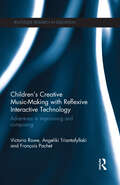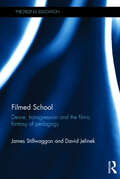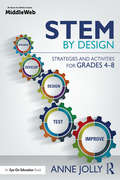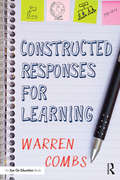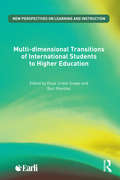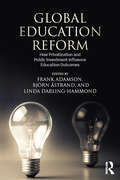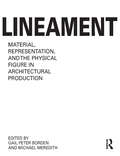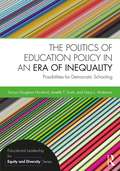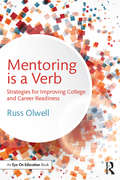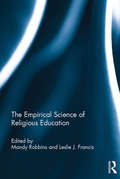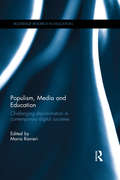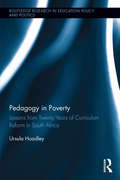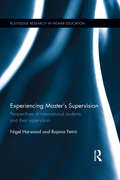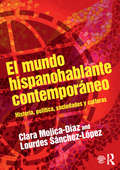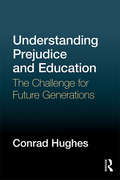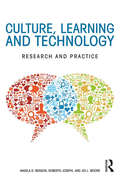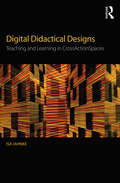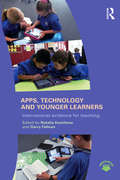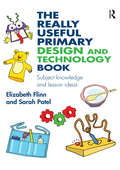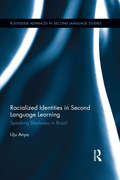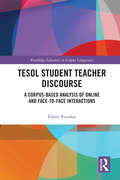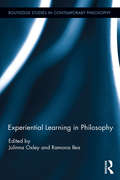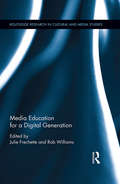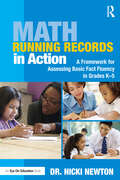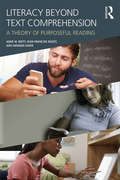- Table View
- List View
Children's Creative Music-Making with Reflexive Interactive Technology: Adventures in improvising and composing (Routledge Research in Education)
by Victoria Rowe Angeliki Triantafyllaki Francois PachetChildren's Creative Music-Making with Reflexive Interactive Technology discusses pioneering experiments conducted with young children using a new generation of music software for improvising and composing. Using artificial intelligence techniques, this software captures the children’s musical style and interactively reflects it in its responses. The book describes the potential of these applications to enhance children’s agency and musical identity by reflecting players’ musical inputs, storing and creating variations on them. Set in the broader context of current music education research, it addresses the benefits and challenges of incorporating music technologies in primary and pre-school education. It is comprised of six main chapters, which cover the creation of children's own music and their musical selves, critical thinking skills and learner agency, musical language development, and emotional intent during creative music-making. The authors provide a range of straight-forward techniques and strategies, which challenge conceptions of ‘difficult-to-use music technologies’ in formal music education. These are supported by an informative collection of practitioner vignettes written by teachers who have used the software in their classrooms. Not only are the teachers’ voices heard here, but also those of children as they discover some of the creative possibilities of music making. The book also provides free access to a companion website with teacher forums and a large bank of activities to explore. A toolkit serves as a database of the teaching activities in which MIROR applications have been used and provides a set of useful ideas regarding its future use in a variety of settings. This book demonstrates that music applications based on artificial intelligence techniques can make an important contribution to music education within primary and pre-school education. It will be of key interest to academics, researchers and postgraduate students in the fields of music education, music technology, early years and primary education, teaching and learning, and teacher educators. It will also serve as an important point of reference for Early Years and Primary practitioners.
Filmed School: Desire, transgression and the filmic fantasy of pedagogy (Theorizing Education)
by James Stillwaggon David JelinekFilmed School examines the place that teaching holds in the public imaginary through its portrayal in cinema. From early films such as Mädchen in Uniform and La Maternelle to contemporary images of teaching in Notes on a Scandal and The History Boys, teachers’ roles in film have been consistently contradictory, portraying teachers as both seducers and selfless heroes, social outcasts and moral models, contributing to a similarly divided popular understanding of teachers as both salvific and sinister. In this book, Stillwaggon and Jelinek present these contradictory images of teaching through the concept of transference—the fantastical belief in another’s knowing that founds a teacher’s authority in relation to her students and, to some degree, the public at large. Tracing the place of transference across a century of school films, each chapter demonstrates the persistence of this fantasy in one of the dreams or nightmares of teaching that recurs thematically in school films: the teacher-as-savior, seducer, signifier in a moribund discourse, and sacrificial object. Through these analyses, the authors suggest that something might be missing in our attempts to theorize education when we leave our unthought fantasies of teaching out of the picture. This book will be of key interest to academics, researchers, and postgraduate students in the fields of educational theory, teacher education, philosophy of education, film and media studies, psychoanalysis, sociology of education, curriculum studies, and cultural studies.
STEM by Design: Strategies and Activities for Grades 4-8
by Anne JollyHow do you create effective STEM classrooms that energize students, help them grow into creative thinkers and collaborators, and prepare them for their futures? This practical book from expert Anne Jolly has all the answers and tools you need to get started or enhance your current program. Based on the author’s popular MiddleWeb blog of the same name, STEM by Design reveals the secrets to successful lessons in which students use science, math, and technology to solve real-world engineering design problems. You’ll learn how to: Select and adapt quality existing STEM lessons that present authentic problems, allow for creative approaches, and engage students in meaningful teamwork; Create your own student-centered STEM lessons based on the Engineering Design Process; Assess students’ understanding of basic STEM concepts, their problem-solving abilities, and their level of engagement with the material; Teach STEM in after-school programs to further build on concepts covered in class; Empower girls to aspire to careers in STEM and break down the barriers of gender bias; Tap into STEM's project-based learning style to attract and engage all students. Throughout this user-friendly book, you’ll find design tools such as checklists, activities, and assessments to aid you in developing or adapting STEM lessons. These tools, as well as additional teacher resources, are also available as free downloads from the book’s website, http://www.stem-by-design.com.
Constructed Responses for Learning
by Warren CombsTeaching students to write constructed responses does not have to become a test-prep chore. An intentional routine of constructed responses provides powerful opportunities to teach strategic thinking through writing that also deepens students’ knowledge about core subjects. In this clear guide from education consultant Warren Combs, you’ll learn how and why to teach students to write these short essays, no matter what subject or grade level you teach. Special features: Writing prompts that are based on Webb’s Depth of Knowledge (DOK) and provide practice for students at all skill levels Practical strategies to build critical thinking and improve students’ writing, including sentence stems, acrostics, framed stories, analogies, and quad clusters Student self-assessment guidelines and rigorous peer-response strategies An interactive log to help you manage best practices and keep students engaged Reading-Writing Modules to help you review and implement the instructional practices and strategies Sample student work, at different levels, with analysis Throughout the book, you’ll find handy tools such as rubrics, logs, and checklists. These tools are also available as free eResources on our website, www.routledge.com/9781138931046, so you can download and print them for immediate use.
Multi-dimensional Transitions of International Students to Higher Education (New Perspectives on Learning and Instruction)
by Divya Jindal-Snape Bart RientiesInternational students experience multiple and multi-dimensional educational and life transitions: moving to a new country, moving to a new educational system and moving to higher educational degree programmes. Within these transitions, they experience differences in the social and organisational cultures, languages, and interpersonal expectations, realities and relationships. Their transitions also lead to, and interact with, transitions of professionals, home students and their families. Multi-dimensional Transitions of International Students to Higher Education provides up-to-date literature, research and theoretical constructs that underpin international students’ transitions to Higher Education. This book will help you to understand the opportunities, issues, social-emotional-psychological dimensions and evidence-based interventions that are vital to support an individual through these educational and life transitions. Split into four sections, topics include: Theoretical Underpinning Research in Different Contexts Impact of Educational Practice and Social Systems Interventions and Strategies Used to Enhance International Students’ Affective, Behavioural and Cognitive Transition Experiences This book is essential reading for professionals, students and policy makers and provides significant research insights to academics and researchers in the area of education, psychology and sociology.
Global Education Reform: How Privatization and Public Investment Influence Education Outcomes
by Frank Adamson, Björn Åstrand, and Linda Darling-HammondWith contributions from Linda Darling-Hammond, Michael Fullan, Pasi Sahlberg, and Martin Carnoy, Global Education Reform is an eye-opening analysis of national educational reforms and the types of high-achieving systems needed to serve all students equitably. The collection documents the ideologically and educationally distinctive approaches countries around the world have taken to structuring their education systems. Focusing on three pairs of case studies written by internationally acclaimed experts, the book provides a powerful analysis of the different ends of an ideological spectrum----from strong state investments in public education to market-based approaches. An introductory chapter offers an overview of the theories guiding both neoliberal reforms such as those implemented in Chile, Sweden and the United States with efforts to build strong and equitable public education systems as exemplified by Cuba, Finland and Canada. The pairs of case studies that follow examine the historical evolution of education within an individual country and compare and contrast national educational outcomes. A concluding chapter dissects the educational outcomes of the differing economic and governance approaches, as well as the policy implications.
Lineament: Material, Representation and the Physical Figure in Architectural Production
by Gail Peter Borden and Michael MeredithThis comprehensive catalogue of contemporary work examines the renewed investment in the relationship between representation, materiality, and architecture. It assembles a range of diverse voices across various institutions, practices, generations, and geographies, through specific case studies that collectively present a broader theoretical intention.
The Politics of Education Policy in an Era of Inequality: Possibilities For Democratic Schooling (Educational Leadership For Equity And Diversity Ser.)
by Sonya Douglass Horsford Janelle T. Scott Gary L. AndersonIn a context of increased politicization led by state and federal policymakers, corporate reformers, and for-profit educational organizations, The Politics of Education Policy in an Era of Inequality explores a new vision for leading schools grounded in culturally relevant advocacy and social justice theories. This timely volume tackles the origins and implications of growing accountability for educational leaders and reconsiders the role that educational leaders should and can play in education policy and political processes. This book provides a critical perspective and analysis of today’s education policy landscape and leadership practice; explores the challenges and opportunities associated with teaching in and leading schools; and examines the structural, political, and cultural interactions among school principals, district leaders, and state and federal policy actors. An important resource for practicing and aspiring leaders, The Politics of Education Policy in an Era of Inequality shares a theoretical framework and strategies for building bridges between education researchers, practitioners, and policymakers.
Mentoring is a Verb: Strategies for Improving College and Career Readiness
by Russ OlwellThis accessible guide offers school leaders a wealth of strategies to foster a culture where educators engage with young people to encourage college readiness and career success. Based in research and best practices, Mentoring is a Verb explains how to build effective mentoring programs as well as encourage educators to individually mentor students. Olwell breaks down the key elements it takes to forge lasting relationships with students and addresses ways to connect to at-risk students. Packed with actionable steps, this book gives you the tools to help your students set high expectations and goals, recognize and address barriers to success, plan for the future, and reach their post-graduation aspirations.
The Empirical Science of Religious Education
by Mandy Robbins Leslie J. FrancisThe Empirical Science of Religious Education draws together a collection of innovative articles in the field of religious education which passed the editorial scrutiny of Professor Robert Jackson over the course of his impactful fourteen year career as editor of the British Journal of Religious Education. These articles have made an enormous contribution to the international literature establishing of the empirical science of religious education as a research field. The volume draws together, organises and illustrates the contours of this emerging field and is an essential compendium which covers work in: teacher education and teacher experience; student understanding, attitudes and values; varieties of religious schooling, and; worldview and life interpretation Organised into ten thematic sections the contributors cover the field comprehensively and bring with them an international and reflexive approach to their research. It is an essential resource for those practitioners and researchers who wish to access original and innovative research undertaken by way of ethnographic fieldwork, practitioner research, life-history approaches to research, psychological scales and measures, and large surveys. Particularly interested readers will be studying PGCE and masters level programmes in religious education, as well as qualified religious educators undertaking continuing professional development.
Populism, Media and Education: Challenging discrimination in contemporary digital societies (Routledge Research in Education)
by Maria RanieriBased on a major research project funded by the European Commission, Populism, Media and Education studies how discriminatory stereotypes are built online with a particular focus on right-wing populism. Globalization and migration have led to a new era of populism and racism in Western countries, rekindling traditional forms of discrimination through innovative means. New media platforms are being seen by populist organizations as a method to promote hate speech and unprecedented forms of proselytism. Race, gender, disability and sexual orientation are all being used to discriminate and young people are the preferred target for populist organizations and movements. This book examines how media education can help to deconstruct such hate speech and promote young people’s full participation in media-saturated societies. Drawing on rich examples from Austria, Belgium, Bulgaria, France, Italy, Slovenia, and the UK - countries characterized by different political and cultural contexts – Populism, Media and Education addresses key questions about the meaning of new populism, the nature of e-engagement, and the role of education and citizenship in the digital century. With its international and interdisciplinary approach, this book is essential reading for academics and students in the areas of education, media studies, sociology, cultural studies, political sciences, discrimination and gender studies.
Pedagogy in Poverty: Lessons from Twenty Years of Curriculum Reform in South Africa (Routledge Research in Education Policy and Politics)
by Ursula HoadleyAs South Africa transitioned from apartheid to democracy, changes in the political landscape, as well as educational agendas and discourse on both a national and international level, shaped successive waves of curriculum reform over a relatively short period of time. Using South Africa as a germane example of how curriculum and pedagogy can interact and affect educational outcomes, Pedagogy in Poverty explores the potential of curricula to improve education in developing and emerging economies worldwide, and, ultimately, to reduce inequality. Incorporating detailed, empirical accounts of life inside South African classrooms, this book is a much-needed contribution to international debate surrounding optimal curriculum and pedagogic forms for children in poor schools. Classroom-level responses to curriculum policy reforms reveal some implications of the shifts between a radical, progressive approach and traditional curriculum forms. Hoadley focuses on the crucial role of teachers as mediators between curriculum and pedagogy, and explores key issues related to teacher knowledge by examining the teaching of reading and numeracy at the foundational levels of schooling. Offering a data-rich historical sociology of curriculum and pedagogic change, this book will appeal to academics, researchers and postgraduate students in the fields of education, sociology of education, curriculum studies, educational equality and school reform, and the policy and politics of education.
Experiencing Master's Supervision: Perspectives of international students and their supervisors (Routledge Research in Higher Education)
by Nigel Harwood Bojana PetrićMaster’s degree programmes are on the rise, attracting growing numbers of international students who speak English as a second or additional language. Experiencing Master’s Supervision: Perspectives of International Students and their Supervisors explores the experiences of supervising and being supervised at Master’s level, charting the difficulties and joys of learning for second language speakers of English while based at a UK university. The authors report the findings of a year of studying both supervisees and their supervisors in four different departments in the social sciences and humanities at a UK research-intensive university. Using a multiple case study approach, and examining supervision in its natural context, this book presents rich descriptions of five case studies: three student-supervisor dyads and two cases of individual students. Analysing rich, first-hand narratives, chapters identify key aspects of satisfaction and dissatisfaction through the eyes of the participants, focusing upon expectations, supervision styles, feedback and students’ support networks, and discussing the broader implications for university and departmental policy makers, responsible for guidelines and requirements. This book contains important insights into the supervisory experience at Master’s level and will appeal to researchers, academics and postgraduate students in the fields of higher education, TESOL, TEFL/TESL and applied linguistics. This book will also be a useful resource for supervisors, leaders of training sessions for supervisors, and for postgraduate directors and teaching committees at universities who develop supervisory guidelines and preparatory sessions for Master’s students.
El mundo hispanohablante contemporáneo: Historia, política, sociedades y culturas
by Clara Mojica-Díaz Lourdes Sánchez-LópezEl mundo hispanohablante contemporáneo: historia, política, sociedades y culturas is a comprehensive and innovative book for advanced students of Spanish. Offering a constructivist approach to the study of the civilizations, cultures and histories of the contemporary Spanish-speaking world, the book focuses on learning as an active process that enables learners to develop high-level critical thinking skills through the exposure, research, examination and discussion of a variety of authentic films, songs and literary texts. Divided into twelve chapters, each chapter begins with an introduction to the general topic followed by various activities that lead students to critically analyse a range of authentic materials. Learners are able to practice higher level critical-thinking and linguistic skills through a wealth of tasks and exercises which culminate in a capstone section that requires the application of?the concepts learned and sources utilized throughout the lesson. El mundo hispanohablante contemporáneo: historia, política, sociedades y culturas offers great flexibility and adaptability to suit advanced courses in Hispanic culture and civilization. Each chapter is methodologically designed with a balanced mix of activities for individual and teamwork. Additional resources are available online for both instructors and students. These include an instructor’s guide with answer key, a grammar supplement and links to the authentic materials referenced within the book.
Understanding Prejudice and Education: The challenge for future generations
by Conrad HughesWhat is prejudice in the 21st Century and how can education help to reduce it? This original text discusses prejudice in detail, offering a clear analysis of research and theory on prejudice and prejudice reduction, drawn from findings in social psychology, critical thinking and education. Presenting the underlying principle that prejudice can be reduced through the development of four core attributes – empathy, understanding, cognitive flexibility and metacognitive thought – the book offers effective educational strategies for preparing young people for life. Chapters explore a range of examples of classroom practice and provide a thorough engagement with the minefield of prejudice, set against challenging sociological, ideological, political and cultural questions. An integrative framework is included that can be adapted and adopted in schools, synthesising findings and emphasising the need for individuals and groups to work against preconceived beliefs and emotional reactions to situations, offering contra-intuitive, rational and affective responses. Understanding Prejudice and Education is essential reading for all those engaged in relevant undergraduate, Master’s level and postgraduate courses in education, social psychology and cultural studies, as well as teachers and school leaders interested in developing strategies to reduce prejudice in their schools.
Culture, Learning, and Technology: Research and Practice
by Angela D. Benson Roberto Joseph Joi L. MooreCulture, Learning, and Technology: Research and Practice provides readers with an overview of the research on culture, learning, and technology (CLT) and introduces the concept of culture-related theoretical frameworks. In 13 chapters, the book explores the theoretical and philosophical views of CLT, presents research studies that examine various aspects of CLT, and showcases projects that employ best practices in CLT. Written for researchers and students in the fields of Educational Technology, Instructional Design, and the Learning Sciences, this volume represents a broad conceptualization of CLT and encompasses a variety of settings. As the first significant collection of research in this emerging field of study, Culture, Learning, and Technology overflows with new insights into the increasing role of technology use across all levels of education.
Digital Didactical Designs: Teaching and Learning in CrossActionSpaces
by Isa JahnkeAs web-enabled mobile technologies become increasingly integrated into formal learning environments, the fields of education and ICT (information and communication technology) are merging to create a new kind of classroom: CrossActionSpaces. Grounding its exploration of these co-located communication spaces in global empirical research, Digital Didactical Designs facilitates the development of teachers into collaborative designers and evaluators of technology-driven teaching and learning experiences—learning through reflective making. The Digital Didactical Design model promotes deep learning expeditions with a framework that encourages teachers and researchers to study, explore, and analyze the applied designs-in-practice. The book presents critical views of contemporary education, theories of socio-technical systems and behavior patterns, and concludes with a look into the conceptual and practical prototypes that might emerge in schools and universities in the near future.
Apps, Technology and Younger Learners: International evidence for teaching
by Natalia Kucirkova Garry FalloonThis book provides an in-depth analysis of the challenges, potential and theoretical possibilities of apps and considers the processes of change for education and home learning environments. Drawing together a diverse team of international contributors, it addresses the specific features, context of use and content of apps to uncover the importance of these tools for young children’s learning. Apps, Technology and Younger Learners focuses on ways that apps support early years and primary school learning, connect various learning spaces and engage children in a range of edutainment and knowledge-building activities. In each chapter, the current state of knowledge and key research questions in the field for future study are identified, with clear messages provided at the end of each chapter. Focusing on empirical studies and strong theoretical frameworks, this book covers four key parts: Understanding the learning potential of children’s apps; Key app challenges; Empirical evidence; Future avenues. This book is an essential guide for educators, post-graduate students, researchers and all those interested in the advantages or challenges that may result from integrating apps into early education.
The Really Useful Primary Design and Technology Book: Subject knowledge and lesson ideas (The Really Useful)
by Elizabeth Flinn Sarah PatelThe Really Useful Primary Design and Technology Book brings together essential subject knowledge and pedagogy to support and inspire those planning to teach D&T in the primary school. Offering comprehensive coverage of the 2014 National Curriculum, as well as exciting ideas to extend beyond it, the book is packed full of everything the busy teacher needs to be able to develop children’s key skills and techniques, and a range of big and small projects to put them into practice. With crucial subject knowledge explained in detail, useful ‘How To’ guides at the end of each chapter reinforce the skills and technology covered with instructions for making a variety of models. Sets of lesson plans include information on the resources needed to support both more and less able children, and assessment guidance, ‘Top Tips’ and ‘Things to Consider’ provide extra help and inspiration. Key topics covered include: cooking and nutrition textiles and the design cycle IT control and monitoring mechanisms structures electronic systems the roles and responsibilities of the DT leader assessment of D&T. The Really Useful Primary Design and Technology Book provides all the information a new teacher needs to be able to teach D&T confidently, and with valuable cross-curricular links and photocopiable templates, even experienced teachers and subject leaders will find fresh inspiration for their lessons.
Racialized Identities in Second Language Learning: Speaking Blackness in Brazil (Routledge Advances in Second Language Studies)
by Uju Anya*Winner of the 2019 AAAL First Book Award* Racialized Identities in Second Language Learning: Speaking Blackness in Brazil provides a critical overview and original sociolinguistic analysis of the African American experience in second language learning. More broadly, this book introduces the idea of second language learning as "transformative socialization": how learners, instructors, and their communities shape new communicative selves as they collaboratively construct and negotiate race, ethnicity, gender, sexuality, and social class identities. Uju Anya’s study follows African American college students learning Portuguese in Afro-Brazilian communities, and their journeys in learning to do and speak blackness in Brazil. Video-recorded interactions, student journals, interviews, and writing assignments show how multiple intersecting identities are enacted and challenged in second language learning. Thematic, critical, and conversation analyses describe ways black Americans learn to speak their material, ideological, and symbolic selves in Portuguese and how linguistic action reproduces or resists power and inequity. The book addresses key questions on how learners can authentically and effectively participate in classrooms and target language communities to show that black students' racialized identities and investments in these communities greatly influence their success in second language learning and how successful others perceive them to be.
TESOL Student Teacher Discourse: A Corpus-Based Analysis of Online and Face-to-Face Interactions (Routledge Advances in Corpus Linguistics)
by Elaine RiordanThis book explores the use of online and face-to-face interactions in language teacher education (LTE) by assessing the formation and practices of a community of practice (CoP), and evaluating the roles discussions between student teachers and a peer tutor can play in terms of identity formation, articulating narratives, reflective practices, and maintaining affective relationships. The specific context within which this is embedded is a Teaching English to Speakers of Other Languages (TESOL) programme, often known as English Language Teaching (ELT), at a third-level Irish institution. The data drawn on come from student teachers on a master’s (MA) programme who interacted with a peer tutor (the researcher) via a number of modes (face-to-face and online). The approach to data analysis is a corpus-based discourse analytical one, which examines the linguistic features of student teacher and peer tutor talk; the features of CoP practices in the discourse; and how different modes of communication shape the nature of this discourse. Perceptive data from the student teachers is used to outline their reactions to the modes of communication and the activities they participated in.
Experiential Learning in Philosophy: Philosophy Without Walls (Routledge Studies in Contemporary Philosophy)
by Julinna Oxley Ramona IleaIn this volume, Julinna Oxley and Ramona Ilea bring together essays that examine and defend the use of experiential learning activities to teach philosophical terms, concepts, arguments, and practices. Experiential learning emphasizes the importance of student engagement outside the traditional classroom structure. Service learning, studying abroad, engaging in large-scale collaborative projects such as creating blogs, websites and videos, and practically applying knowledge in a reflective, creative and rigorous way are all forms of experiential learning. Taken together, the contributions to Experiential Learning in Philosophy argue that teaching philosophy is about doing philosophy with others. The book is divided into two sections: essays that engage in the philosophical debate about defining and implementing experiential learning, and essays that describe how to integrate experiential learning into the teaching of philosophy. Experiential Learning in Philosophy provides a timely reflection on best practices for teaching philosophical ideals and theories, an examination of the evolution of the discipline of philosophy and its adoption (or reclamation) of active modes of learning, and an anticipation of the ways in which pedagogical practices will continue to evolve in the 21st century.
Media Education for a Digital Generation (Routledge Research in Cultural and Media Studies)
by Julie Frechette Rob WilliamsMedia education for digital citizenship is predicated upon the ability to access, analyze, evaluate and produce media content and communication in a variety of forms. While many media literacy approaches overemphasize the end-goal of accessing digital media content through the acquisition of various technology, software, apps and analytics, this book argues that the goals for comprehensive and critical digital literacy require grasping the means through which communication is created, deployed, used, and shared, regardless of which tools or platforms are used for meaning making and social interaction. Drawing upon the intersecting matrices of digital literacy and media literacy, the volume provides a framework for developing critical digital literacies by exploring the necessary skills and competencies for engaging students as citizens of the digital world.
Math Running Records in Action: A Framework for Assessing Basic Fact Fluency in Grades K-5
by Nicki NewtonIn this new book from popular consultant and bestselling author Dr. Nicki Newton, you’ll discover how to use Math Running Records to assess students’ basic fact fluency and increase student achievement. Like a GPS, Math Running Records pinpoint exactly where students are in their understanding of basic math facts and then outline the next steps toward comprehensive fluency. This practical book introduces a research-based framework to assess students’ thinking and move them toward becoming confident, proficient, flexible mathematicians with a robust sense of numbers. Topics include: Learning how often to administer Math Running Records and how to strategically introduce them into your existing curriculum; Analyzing, and interpreting Math Running Records for addition, subtraction, multiplication, and division; Using the data gathered from Math Running Records to implement evidence-based, research-driven instruction. Evaluating students’ speed, accuracy, flexibility, and efficiency to help them attain computational fluency; Each chapter offers a variety of charts and tools that you can use in the classroom immediately, and the strategies can easily be adapted for students at all levels of math fluency across grades K-8. Videos of sample running records are also available for download at https://guidedmath.wordpress.com/math-running-records-videos.
Literacy Beyond Text Comprehension: A Theory of Purposeful Reading
by M. Anne Britt Jean-François Rouet Amanda M. DurikLiteracy Beyond Text Comprehension aims to systematically investigate how readers interpret reading tasks within a situation, and how that interpretation influences reading behavior and comprehension. Presenting a new model of REading as problem SOLVing (RESOLV), the authors describe reading comprehension in terms of how a reader adopts goals within a particular situation that then guide what is read, when, and how. By applying the RESOLV model to a range of reading situations, this book provides evidence to suggest that there is no unitary understanding of a task, because individuals bring their own goals and characteristics to the situation; as such, it demonstrates the importance of understanding how a reader (e.g., student, test-taker, employee completing a work task) represents the context and the specific assignment. Written by internationally recognized learning sciences scholars, Literacy Beyond Text Comprehension advances the state of the art in reading research, but also seeks to inform a broader range of audiences, including those interested in the teaching and the assessment of reading.
